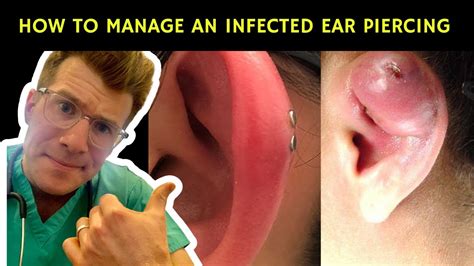How to Treat an Ear Infection From Earrings
Ear infections are a common nuisance, and sometimes, they're directly linked to our favorite accessories: earrings. That irritating itch, redness, and swelling? It could be an ear infection stemming from your earrings. This post will guide you through identifying the problem, treating the infection, and preventing future occurrences.
Identifying an Ear Infection Caused by Earrings
Before diving into treatment, it's crucial to correctly diagnose the issue. An ear infection from earrings usually presents with several key symptoms:
- Pain and tenderness: The earlobe, and possibly the surrounding area, will feel sore and painful to the touch.
- Redness and swelling: The pierced area will be noticeably red and inflamed.
- Pus or discharge: A yellowish or greenish pus might ooze from the piercing site.
- Warmth: The infected area may feel warmer than the surrounding skin.
- Itching: Persistent itching is a common symptom.
Important Note: If you experience severe pain, high fever, or significant swelling, seek immediate medical attention. This could indicate a more serious infection requiring professional treatment.
Treating an Ear Infection from Earrings
Treating an ear infection at home should only be attempted for mild cases. For moderate to severe infections, always consult a doctor. They can provide a proper diagnosis and prescribe appropriate antibiotics if necessary.
Here's how to approach a mild infection at home:
1. Remove the Earrings Immediately
The first and most critical step is to remove the earrings. This prevents further irritation and allows the piercing to heal. Don't try to force them out if they're stuck; gently try twisting them, and if they won't budge, seek professional help.
2. Clean the Piercing
Gentle cleaning is vital. Use a mild, unscented soap and warm water to clean the affected area. Gently cleanse the piercing site twice a day, being careful not to scrub vigorously. Pat the area dry with a clean, soft towel.
3. Apply a Warm Compress
Applying a warm compress can help reduce swelling and pain. Soak a clean cloth in warm (not hot) water, wring it out, and apply it to the infected area for 10-15 minutes several times a day.
4. Over-the-Counter Pain Relief
Over-the-counter pain relievers, such as ibuprofen or acetaminophen, can help manage pain and reduce inflammation. Always follow the recommended dosage on the packaging.
5. Avoid Irritants
Stay away from cosmetics, lotions, and other products that might irritate the infected area. Keep the piercing clean and dry.
Preventing Future Ear Infections from Earrings
Prevention is key to avoiding future ear infections. Follow these tips:
- Choose hypoallergenic earrings: Opt for earrings made from nickel-free metals, such as surgical steel, titanium, or gold. These are less likely to cause allergic reactions.
- Clean your earrings regularly: Before and after wearing, gently clean your earrings with soap and water.
- Don't touch your piercings unnecessarily: Avoid touching or fiddling with your piercings to prevent the introduction of bacteria.
- Keep your piercing clean: Follow a consistent cleaning routine, especially during the initial healing phase.
When to See a Doctor
While home remedies can be effective for mild infections, it's crucial to seek medical attention if:
- Symptoms worsen: Increased pain, swelling, or discharge indicates a more serious infection.
- You have a fever: A high fever is a sign of a systemic infection requiring professional treatment.
- The infection doesn't improve after a few days: If home remedies aren't working, consult a doctor.
By following these guidelines, you can effectively treat mild ear infections caused by earrings and prevent future occurrences. Remember, prevention and early intervention are key to maintaining healthy and happy ears!
